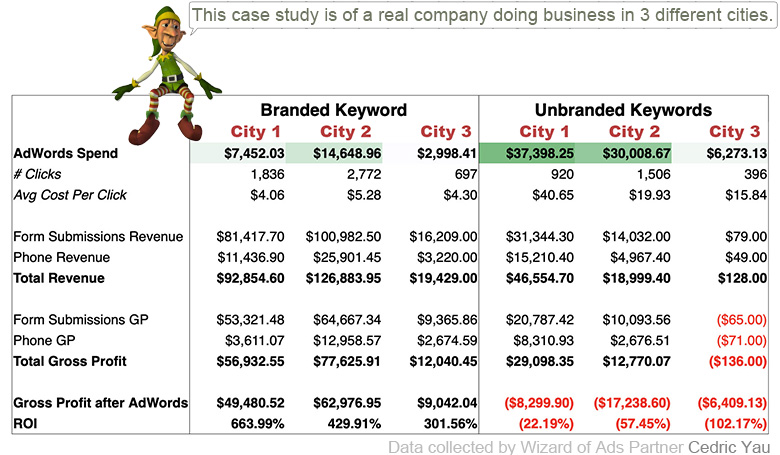
A branded keyword is one in which the name of your company appears. When a customer types the name of your company into a search string, they are looking for you, they believe in you. A friend might have recommended you, but usually it was your advertising that won them over.
Either way, you have done well.
Unbranded keywords include phrases like “air conditioning repair” and “diamond engagement rings.” When a shopper types an unbranded keyword into a search engine, it is a clear signal that they have no preferred provider in your category. No one has won them over.
The best online marketers track their branded and unbranded keywords separately because they know that when you follow unbranded keywords all the way from the search string to the gross profit made on those sales, you will often find you spent more money on unbranded keywords than you made on the sales they brought in.
That’s when you should drop them like a hot rock.
Look at the case study at the top of this page. I have removed the name of the company, the category, and the cities, but the data is real, it is recent, and it is accurate.
We spent $37,398 in unbranded keywords in City 1 so that we might have the privilege of losing $8,299.
We spent $30,008 in unbranded keywords in City 2 so that we might have the privilege of losing $17,238.
We spent $6,273 in unbranded keywords in City 3 so that we might have the privilege of losing $6,409.
After losing $31,946 we grew tired of feeling privileged.
Meanwhile, in City 1 our investment of just $7,452 in branded keywords made us a gross profit of $49,480 after deducting the cost of our branded keywords.
In City 2 our investment of just $14,648 in branded keywords made us a gross profit of $62,976.
In City 3 our investment of just $2,998 in branded keywords made us a gross profit of $9,042.
But all the young digital weasels tell me I’m not looking at it correctly. They scold me for tracking branded and unbranded keywords separately, and smugly point out, “When you combine them into one big package, the return on investment is perfectly acceptable.”
Some of my closest friends are world-famous online marketing experts who know how to create campaigns that allow you to monetize all the customer enthusiasm that has been generated through your radio and TV and outdoor advertising.
None of my friends is young enough or smug enough to be a digital weasel.
Digital weasels always fail to deliver what they proudly promised. Back when I was a 14-year-old boy on the wrong side of a little Oklahoma town, I would have pulled these weasels aside, put my arm around their shoulders and whispered in their ears, “Be careful not to let your alligator mouth overload your mockingbird butt.”
But I have mellowed and matured.
Or at least I pretend I have.
Les Binet and Peter Field did what data scientists do; they monitored the advertising of more than 1,000 businesses for more than 15 years, then published the data.
Binet and Field are not digital weasels. I smile every time I listen to them.

Les Binet says, “If you build your business, or try to build your business, using short-term efficiency measures – cost per response, click-through rates, that kind of thing – you’re on a hiding to nothing. You’re going to run your business into the ground, we believe, because those are not the things that grow the business, long-term.”
Les Binet goes on to say, “You need to talk to people, not just who are in the market right now, but people who might come to market over the next two to three years. You need to engage them with things that are more humanly relevant, more general, more universal, and crucially, you need to engage them at the emotional level… So if you want really disproportionately large marketing effects, if you want big sales and big profits, aim for fame.”
Is it fame you want? I can give it to you with 3 simple bits of advice:
- Make your radio and TV ads unpredictable and entertaining. Entertainment is the only currency with which you can purchase the time and attention of a too-busy public.
- Work a tiny bit of information into your ads, but not so much that it makes your ads feel like ads.
- Close at least half your ads with something new, surprising, and different; something that gives the customer a tiny, inward smile.
I’m really glad you came out to play but I’ve got to go now. My mom is calling.
Roy H. Williams
 Jeff Seckendorf draws a clear distinction between experts, and experts who can teach. Whether it’s scuba diving, aerial acrobatics, brain surgery, or auto repair, Jeff Seckendorf can not only teach the subject, but he can train others to teach it as well. His secret is allowing others to be the subject-matter experts while he zeros in on the process of education. Class begins as soon as you arrive at MondayMorningRadio.com
Jeff Seckendorf draws a clear distinction between experts, and experts who can teach. Whether it’s scuba diving, aerial acrobatics, brain surgery, or auto repair, Jeff Seckendorf can not only teach the subject, but he can train others to teach it as well. His secret is allowing others to be the subject-matter experts while he zeros in on the process of education. Class begins as soon as you arrive at MondayMorningRadio.com